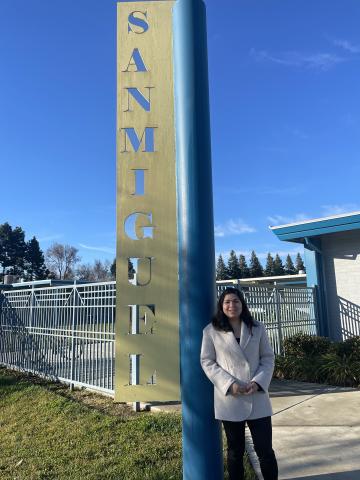
CHAC Practicum Provides PhD Student Opportunity to Serve Latinx Community

Levi Bedregal is a third-year PhD in Clinical Psychology student. She is also a practicum student with long-time PAU partner, the Community Health Awareness Council (CHAC).
CHAC, a nonprofit agency, is committed to strengthening the lives and communities in northern Santa Clara County “through access to comprehensive and culturally responsive mental health services.” One aspect of CHAC’s work, and that which Bedregal is most involved with, is the integrated care model in four Santa Clara County school districts supporting “the psychological and emotional well-being of students in grades K-12.”
Bedregal has worked with CHAC since September to provide weekly, individual therapy to nearly a dozen children, and group therapy to more. At a school with more than 300 children and only two PAU / CHAC student clinicians, managing the caseloads is like working a puzzle.
“You have to get creative when you have restrictions, like the timeslots,” Bedregal said. “We’ve looked at the kids seeking support and, when it makes sense, asked if a group approach would make sense for their individual needs. We all try to work together to make it make sense, so that everyone gets seen, while still addressing why the child was referred.”
At the end of February, Bedregal will begin offering whole-classroom social-educational learning, which will present a new challenge for her. “I’m a shy person!" she said. "But I try to focus on the reasons I want to do this work. Or why it would be important to do this.”
And there are certainly important reasons to do this work. “There is such a huge need, especially after the pandemic,” Bedregal said. “In all my consultations with the teachers, social worker, vice principal, and principal, it’s my understanding that a lot of the kids who are starting third grade, didn’t really get the first and second grade socialization norms. So when they come back to a third grade classroom after the pandemic, they’re not where they need to be. There’s a lot that needs to be done to help everyone catch up.”
Bedregal has firsthand, personal experience with this effort to “catch up.” Her family immigrated to the U.S. from Peru when she was five years old. She was initially tested as “severely below average” on academic tests when she started school, but she was also navigating the U.S. school system with very limited English language skills.
From the 1st through 5th grade, Bedregal received one-on-one language instruction for 30 minutes every school day. Her family recognized that more was needed and help was at their doorstep.
“My mom was super creative,” she said. “She saw that there were people from the church who would always knock on the door, offering to do Bible readings. So she took them up on that, in English. An additional two-hours of Bible reading, every day, really helped me zone in on that ability.” By the 5th grade, Bedregal was testing well above average on academic assessments.
Her personal history helps her better understand some of the children she’s working with now and allows her to show empathy. But she recognizes that not everyone charts the same path.
“I really do think psycho-educational training at an elementary level would be such a game changer in the prevention of depression and anxiety. Hopefully, if these kids gain a lot of skills from 1st grade to 5th grade, they’ll be less likely to have depression and anxiety when they’re adults,” said Bedregal.
CHAC’s curriculum builds awareness of feelings, offers breathing and meditation practices, and is attempting to increase the time between action and reaction.
“Disproportionately, it seems like little boys are more likely to be observed as impulsive or have externalizing behaviors that get them referred to counseling,” said Bedregal. “And it’s hard: when you’re little, your executive functioning is not fully developed. Your ability to have inhibition or impulse control is still a developing skill.”
Bedregal will step into the classroom later this month, and continue her practicum through the academic year. Ultimately, she wants to be a neuropsychologist, and she is studying in the Neuropsychology emphasis within the PhD program.
While her work at CHAC is not directly related to her neuropsychology career goals, one of her goals is to contribute to the Latinx community.
“I think I need to be here [at CHAC],” she said. “With my life history, with my experiences, I’m really glad I can be here. Because it’s really hard to be in a doctoral program. The amount of privilege to do that is kind of insane. I’m finally doing what I always said I would do, which is help the Latinx community and address some of the unmet mental health needs. I always said I would be a part of that, and now I’m actually part of it.”
